The Space of Mugham, from 9-19 March, was a feast of music from countries that share the spirit and wonder of mugham and makam, the perfect run up to the Novruz Bayram spring holiday. With musicians from China to the USA and from Uzbekistan to India, the geographical embrace also ensured that there were concerts in all parts of unoccupied Azerbaijan, including Nakhchivan. Given the country’s unique genius for musical synthesis, opera, ballet, jazz and symphonic music were naturally also on offer. Busy work schedules notwithstanding, the programme was simply too tempting and the nightly struggle for seats at the Mugham Centre invariably left standing room only for some.
Variety there was; from returning guests like Iraq’s professorial Hussain Al Adhamy to the more exotic Beautiful Girls from China; in their many forms most of the instruments were recognisably traditional strings, wind and percussion, but the Kuwaitis played ceramic pots and a metal goblet, and added dance to their performance. There were less formal sessions like an afternoon in the Old City’s Mugham Club restaurant, with Jeffrey Werbock displaying his virtuoso versatility and Ramiz Quliyev jamming on tar with the Turasu Libya Makam group.
Apart from the opening days in Baku and the regions and the grand closing concert and awards ceremony, there was a master class for youth which gave the capital’s audience an enjoyable glimpse into a promising mugham future. Each of the other seven nights in the Mugham Centre saw Azerbaijani musicians perform one of the seven main modes of mugham: Rast, Shur, Segah, Chahargah, Bayati-Shiraz, Shushtar and Humayun.
Turkey’s Voice of Anatolia group, led by the popular, lightning-quick hands of Misirli Ahmad on darbuka (goblet drum) opened the festival’s penultimate day and their wonderfully lively performance was probably the perfect setting for the contrast which followed with Nazaket Teymurova and Vafa Vezirova singing the melancholic tones of a Humayun mugham. The combination of the voices with two balabans (drone and melody) was overwhelmingly soulful and made this one of two concerts which compelled this reviewer to forget about notes, pictures, work – everything but the beauty of the performance. You had to be there
The Saturday evening concert began with the Al Adwar group, led by Moroccan-born singer Aïcha Redouane and her Lebanese husband Habib Yammine in a performance of Maqam’s Soul. Their music has a strong Sufi influence; the opening song was a setting of a 14th century Sufi poem. Redouane’s singing was almost trance-like in its invocations, taking breaks and breaths as if she was contemplating the mysteries behind each phrase. Far from remote, however, she was keen to communicate her joy at being in the company of so many branches of the same musical tree.
Alim Qasimov knows the rules well enough to break them, as they say, and he has his critics among traditionalists, but the hour-long rendering he and daughter Fergana Qasimova gave of Bayati-Shiraz was spiritually out of this world. The singing and playing soared and swooped, urged and bewailed, demanded and warmed, taking the audience to the sublime. The exchanges between the group (tar, kamancha, balaban, nagara) were as beguiling: the weaving of appeals and responses, the smiles and nods encouraging exploration and enjoyment. In all, the most exhilarating musical expression of life’s yearnings.
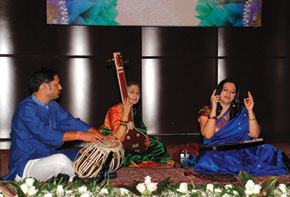
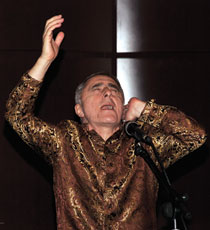
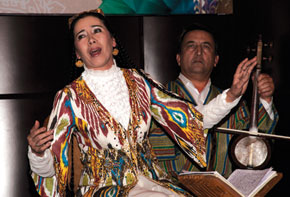
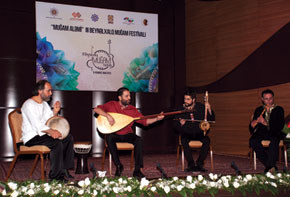

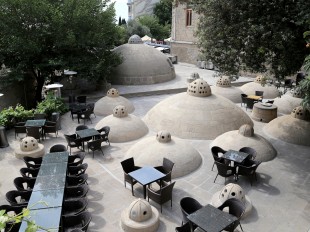
.jpg)